Phish: The Undefeated Season
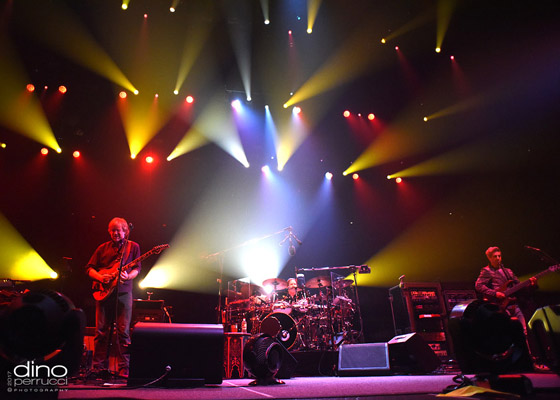
Photos by Dino Perrucci, Bill Kelly and Dean Budnick
IN 1997 PHISH DESTROYED AMERICA. IN 2017, THEY CAME BACK TO SAVE IT.
Like everybody else the past couple of weeks, I want to talk about Phish’s Baker’s Dozen residency at the world’s most famous arena. But first let’s go back to July 2, 2015.
The night before Fare Thee Well’s now-legendary three night stand at Soldier’s Field, I sat in the lobby bar of Chicago’s Ritz Carlton with Mike Gordon, casually discussing the arc of creativity and the life of an artist. The initial purpose of our rendezvous was a simple handoff — I was bringing him a set of tickets to Bill Kreutzmann’s private box for the shows. The irony of that exchange may not have been known to him…but it was certainly not lost on me.
After handing him the envelope, we ordered a round of drinks and segued into an unexpectedly philosophical conversation. Earlier that spring, I had worked with Gordon for a week or so, in “theoretical rehearsals” at Bob Weir’s studio in San Rafael, where he was enrolled in his own version of Dead Camp — separate from Trey Anastasio’s and separate from Fare Thee Well.
As it so happens, the two Phish bandmates were individually studying the Grateful Dead’s music — learning the nooks and exploring the crannies — at the same time, but in parallel universes.
One for Fare Thee Well. The other with a group that eventually morphed into what is now Dead & Company. Trey and Mike sent texts back and forth about their experiences in real time.
I don’t know what was said between them. I just remember that Mike grinned when his phone vibrated and he looked up and explained why, then redirected his attention back to his iPhone as he typed a response.
That evening in Chicago, on the eve of Fare Thee Well, I understood that Mike didn’t sit down with me to talk about Phish, and I didn’t particularly want to discuss the Dead. We were both on break.
But all around us, Deadheads were amassing, gathering, expanding exponentially. Pretty soon the entire city of Chicago would be consumed by what was being advertised as the final three shows featuring all four surviving members of the Grateful Dead. And while I don’t think there’s any doubt that Trey’s participation energized both fan bases, “Phish, the band” wasn’t really a part of that narrative, by itself.
To wit, nobody really noticed (or cared) that Gordon was sitting there, in plain sight, at the lobby bar. As the number of people standing around us grew, so did the excitement over the next day’s opening night. It’s precisely that energy — the same exact energy — that burns perceptible coronas around so many different circles of friends, mine included, melting their auras into a celestial ball of goo the night before a particularly anticipated Phish run. And from the waiting area at baggage claim to the peanut bars that line the neglected neighborhoods around America’s old hockey arenas, everyone’s little orbits starts to run together, overlap, symbiotically. You want a direct connection between Phish and the Grateful Dead? That’s it right there. Energy.
As dull, unimaginative journalists have pointed out for years, there’s endless parallels between the two bands…err…at least…the structures of their scenes. Despite the obvious musical differences, there are some real connections, of course. Runoff. It’s music, not sports.You can root for both teams.
A new arrival at the lobby bar shouted across the room: “MG!! MG!! MG, is that you!?” I looked up, expecting our cover to be blown. But no. They looked right past Mike Gordon, trying to get the attention of Mountain Girl, who was at a nearby table with her daughters. Jerry’s daughters.
Uninterrupted, Mike and I continued our conversation. I was trying to get his thoughts on whether or not the caliber of creative output over the span of an artist’s career was necessarily an arc versus an arrow. I knew what I was doing: I was talking Phish without actually talking about Phish. I pondered the erosive effects that both age and success can have on the cliffside face of a musician’s work. Why do artists tend to produce their most groundbreaking works — be it albums, books, movies, paintings, whatever — in the first third of their career? I pointed to Metallica, Prince, U2, The Who, Bruce Springsteen. But I was thinking about “You Enjoy Myself” versus, say, “Time Turns Elastic.” I’m a fan of both songs, mind you… but only one of them changed my life.
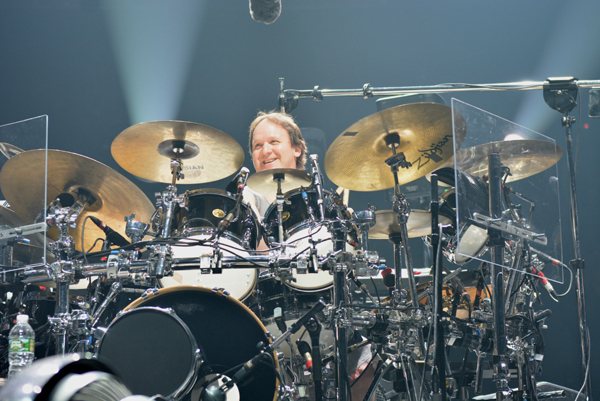
—— Phish Food, Pre-Donuts —-
I was around 12 years old when my life was saved by rock ’n’ roll. With all the spitfire typical of an American boy of that age, I could feel wings starting to grow on my back but instead of teaching me how to fly, they just made me aware, perhaps for the first time, that I was trapped like a caged bird in the Pennsylvania suburbs. Wings or no wings, before I could even attempt flight, I was going to have to be paraded around middle school like a circus elephant for a few years only to be herded with the rest of the show stock into an institution known as high school.
I found comfort and company in heavy metal, relating to the angst of bands like Judas Priest (“So much for the golden future, I can’t even start / I’ve had every promise broken, there’s anger in my heart.”) and the zero-fucks-given rebellion of Sunset Strip misfits like Guns ’n’ Roses as they welcomed me to the jungle. Their music felt like an initiation rite.
And then, sometimes, all I could do to keep sane was to rage against the machine with Rage Against the Machine — “Fuck you, I won’t do what you tell me.”
But by the time I got to college, all those growing pains had subsided and my piss and vinegar had been replaced by the promise of milk and honey. I got out of that cage and went from the restrictions of boarding school to the emancipation of a liberal arts college. I subconsciously started sporting a goofy grin to accompany my ever-lifted mood. I couldn’t hold it in. I couldn’t hold it back. I was unshackled and on the loose. I borrowed liberally from previous generations, stole Kerouac’s complexion, went down Robert Hunter’s backroads, and reliably always had a notepad of my own and several pens on my person every step, skip and hop I took — I was starting to get ideas. All kinds of ideas, really. About everything from love and sex to recreational chemistry. Politics. Community. Fashion. Morality. Mortality. And, in the meantime, everything that wasn’t fun could at least be turned into something funny.
So it made sense that my world would be rocked by a rock band that would pause their euphoric rock concerts so their dress-wearing drummer could take a vacuum solo — yes, that’s right, a vacuum solo — in the middle of a showtune from the Jungle Book. Musically, they were beyond description, beyond compare. Aesthetically, they were almost as dorky as my own dorky family.
And even while they set about to radically redefine the boundaries of “dance rock,” they did so with intention on the one hand and abandon on the other. They were perfect. And thus they became the most incredible score to my 20s, from my registration and enrollment through my full-on membership into adulthood.
The torture of trudging across teenage wastelands had shape-shifted into effortlessly joyful outings with college friends, burning down bowls in the woods behind the dorm and occasionally trespassing into the nearby cornfields and logging trails with electric third-eyes wide open, staring off into other dimensions while watching the snowfall blanket the Berkshires, as if for the very first time. “I see them through a crystal haze.” It was that time in life when all you really wanted to do, and all you really needed to do, was to get your rocks off, any way you could. Everything was important. Everything was enormous. Everything was rapturous. And yet, everything was also, somehow…ridiculous. In the most delightful way. “Yeah, our children are old enough to Read Icculus.”
It felt natural that the band we all listened to, then, would sometimes navigate their way through visionary but complicated compositions with incredible speed and accuracy, then casually unstrap their instruments and jump around on trampolines in synchronized routines before ending up in an improvised vocal jam in which one guy sounded like he might be repeating the word “tequila” while another might be quoting “We Will Rock You,” but, then again, who’s to say? It was all giberish-ish and all in the name of fun. It was just fun. They would even crack each other up; that was more than half the point.
After jamming out a four minute song for ten minutes, they were likely to take a left turn and play an old-timey bluegrass rag earnestly and without amplification, only to launch into an original fugue. Halfway through any given set, but not just any night, their lead singer might insist that the band start vamping the middle of a song so he could ad lib a story, improvising a narrative about how the venue that everybody thought they were standing in was actually breaking apart and falling through space and the audience along with it, falling, floating, flying, and eventually landing in a mysterious land called Gamehendge. The band would actually improvise to the words, creating a soundtrack for a made-up movie, some kind of psychedelic vehicle, revving its engines at the intersection of art-rock and merry prankster. A brief pause while they collected themselves and shwoosh, right into a Led Zeppelin cover. “Good times, bad times / you know I’ve had my share.” I could relate. I was sold. You didn’t just become a fan of this band, you became a player on its team. So be it. Give me a jersey, a number, and put me in, coach.
It was always music first, it had to be if it was going to work, but Phish didn’t JUST shred harder, jam better, risk more, and take their fans to higher and more transcendental places — musically — than their contemporaries, but they also somehow crossed that finish line with so much ease and confidence that they were able to enjoy themselves and taste the moment, unwilling to mask their amusement when the audience would unwittingly sing along to one of the band’s many inside jokes. “Thank you, Mr. Miner.” “Wash Uffize drive me to Firenze!”
We were laughing too, though, because as powerful as their music was, it was all framed as a sort of prank that you couldn’t quite put your finger on. There were plenty of spots for catharsis and deeper meaning, if you knew where to look, but if you walked in off the street and weren’t initiated, you were likely to witness the lead singer running around the stage making weird sounds with a megaphone while the bassist yelled something about a big, black, furry creature from Mars. Minutes later, everyone on stage and many of the people in the audience would fall down, on cue, in the middle of a jam. Or the band would crowd around a microphone to croon an a cappella barbershop quartet tune, non-ironically, then sing in jest about roadkill, with a musical wink-wink and a theatrical smirk. I loved all of that. I was in college then and needed a spoonful of sugar with my medicine. It was fun. It was psychedelic. Musically, it was head over heels above what most other rock bands were doing at the time, and stylistically, it was entire galaxies away from anything I had ever seen in the entire Milky Way. It was captivating entertainment served with relief, release, and epiphany as mere side-dishes to the main course.
Also — and many people forget this — even though Santana, Frank Zappa, the Meters, Queen, the Allman Brothers, King Crimson and, of course, the Grateful Dead all came before them, nobody sounded anything quite like Phish when they first came onto the scene. They were the bastardized love-child of all those bands.
But, these days, when the uninitiated find themselves at a Phish show, they’re much more likely to hear the band singing a fairly straightforward arena-rocker wishing someone a happy birthday than they are likely to witness Fishman take centerstage for a half-baked rendition of a Neil Diamond hit, in which you can’t tell if they’re making fun of the song, the audience, or themselves. But probably themselves.
As the band transitioned from a grassroots sensation to an arena institution, the players slowly transformed from being college kids with nothing to lose and everything to prove, to being middle-aged dads with nothing left to prove but everything to lose. And that’s fine because it’s honest.
So maybe that means that they tend to play less songs about the imaginary Lizard people of Gamehendge and more tunes about family, connections, mortality, and meaning. And that’s also fine.
Because that’s also honest. It’s who they are versus who they were. But who I am is also different from who I was and so I seem to have made that transition with them. I imagine the same can be said for the majority of their aging fanbase.
I can certainly feel it in my own life. I never lost that child-like spark or that adolescent enthusiasm, that zeitgeist, that drive, that crush not just on the girl sitting next to me on the bus but on everything that crosses my gaze outside the window as well, as the bus careens down life’s highway. I never lost that… but, even now, days will go by when my eyes are too focused on my little iPhone screen to even notice the girl sitting next to me, much less to steal a glance outside the window. It’s just not always practical.
And while Phish has never really had a creative drought in terms of their special blend of zany (“Wombat,” “Waking Up Dead,” and “Ass Handed” all come to mind), for more than thirty years, when Trey and Mike jump on trampolines during “You Enjoy Myself,” you literally know every turn they’re going to make, including the dismount. Punch lines tend to lose a little impact when the joke becomes standard procedure.
Phish has never stopped being my favorite band on the planet, but I wonder if there was ever a time when they stopped being theirs.
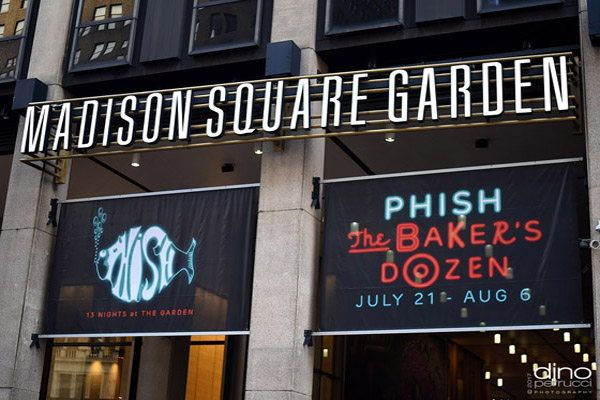
Continued from page 1
— AND THEN THERE WERE THIRTEEN —
After two decades and more than 300 shows, I think it’s safe to say that I’m not going anywhere as a fan. But in the Summer of 2016 — as with certain lulls before then — there were times when it started to feel like a conscious effort to keep up with the hobby of Phish. Most bands never demand that much attention to begin with — you love the album, you see the concert, and for the following one to four years, you maybe wear the shirt at a friend’s barbecue and break the ice with some stranger who loves that one song. But Phish is a lifestyle band; the time and attention they demand in order to just keep up with what’s going on forces a relationship with their fans that’s more invested than the passive listen you might give some band that you think you probably liked when you walked past their set at the festival on the way to your RV. Phish is a more active pursuit, which means the band needs to be out there winning games or else they risk taking a seat next to dusty baseball cards and pet rocks in your mom’s basement.
Listen: From the time Phish announced 13 shows at the Garden right up until opening night, I wasn’t sure how many shows I’d actually attend. Three? Six? Flying in from California meant a certain commitment. In 1997, missing even one would’ve been out of the question. But in 2017, going into it, there didn’t seem to be the same imperative that there used to be. There was a time when there was a lot more at stake if you sat out a show. Maybe you missed a show where they played their new album front to back, the very same night that they broke out a complete Gamehendge. Maybe you missed a landmark 34-minute “You Enjoy Myself” complete with Beavis and Butthead samples. Maybe you missed a cover of Pink Floyd’s Dark Side of the Moon…in its entirety… performed in the middle of just one of their own songs. There was no telling what any night would bring and the anticipation was rarely all hype.
These days the risk goes the other way — you might fly to Seattle, Washington, and from there have to drive three hours into oblivion for a weekend at the Gorge. And when you come home, you have a couple new stories, some Instagram-worthy photos, and a handful of wonderful new memories…but you might not have anything new to add to your permanent Phish collection.
I went to Phish at the Gorge in 2016 and it was just one more weekend adventure in my endlessly adventure-filled life. I loved every second of those shows. I really did. But I haven’t listened to them since, and it didn’t change my life the way it did when I jumped into my friend’s car after Thanksgiving dinner, so we could hightail it up through three feet of snow to Worcester, MA to catch the band’s Thanksgiving run, circa 1997.
Yes, Phish changed my life, and having changed it once, what came after — repeatedly — was merely life-affirming. Life-enhancing. Again and again. Life-affirming. Life-enhancing. But not life-changing. Not life-defining. That kind of thing only really comes along once, maybe twice, on our respective paths. Especially at the hands of a band, or at the behest of rock ’n’ roll. But I have to believe that there’s more than one college kid out there who will tell you that what they just saw at Madison Square Garden did, indeed, totally rock their worldview, open up their sky, and change their life. God, I hope so.
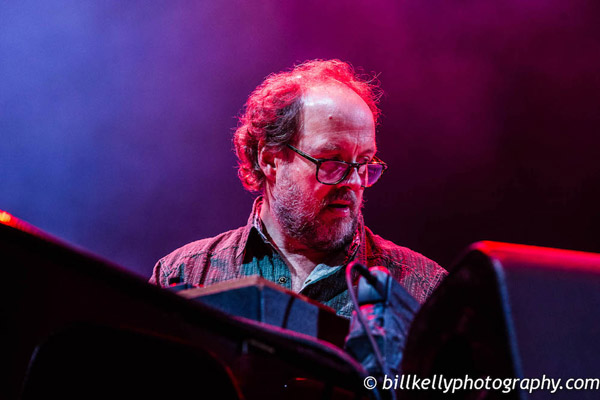
— About that Big Apple Donut —
I don’t believe that music is a numbers game, despite the math involved in making it. However, there are certain numbers that are hard to ignore. As has been widely reported and remarked upon these past few weeks, Phish’s now-historic Baker’s Dozen’s run at MSG consisted of 13 consecutive shows. During a 17-day span, Phish performed 26 sets of music, containing 237 different songs. And my apologies to Lars Ulrich for the misconception, but no less than 176 of those were originals, leaving room for “just” 61 covers — roughly 25%, which to put it in perspective, is the equivalent of a really generous tip for really great service. There were 19 world premieres, which is more debuts than most bands learn in an entire year, even during their career peaks. And still, not one single Bakers Dozen setlist written out in advance. “No repeats” was the plan, but not, like, you know…planned.
Phish could’ve played a 14th, perhaps even a 15th show, and still continued their no-repeat streak without sacrificing the show’s impact or completeness. Arguably, in fact, such a move would encourage yet one more legendary performance, not only because of the context, but because Phish just proved that when they force their neurological pathways to take detours and when they’re rerouted away from automatic showstoppers and setlist patterns, they’re forced to actually, you know — jam as well as they’ve ever jammed. They’re forced back in the driver’s seat on a track they’ve never seen as they race to stay in first place.
Of course, this is what many of us are hoping for at Dick’s. I’m not hoping too hard, though, because Phish is merely my favorite band on the planet. They’re not always the coolest. They didn’t think to withhold “Tweezer Reprise” from bookmarking MSG, instead playfully opening Dick’s with it. They didn’t think to leave “You Enjoy Myself” out of the Baker’s Dozen entirely, just so they could say they slayed a record-breaking residency at the Garden without breaking out their signature masterpiece even once. They didn’t use their Jimmies flavored night to play an entire set of Jimi Hendrix, followed by an entire set of Led Zeppelin. But just the very fact that fans were thinking along those lines before the lights went down that night tells you so much about why the Baker’s Dozen re-energized Phish nation. Anything was possible…again.
At the end of the day, Phish didn’t even do anything all too unusual for them most nights during the Baker’s Dozen, apart from the whole no-repeat thing. That’s one of the things that made it so great. They didn’t ride across the Garden in a giant eclair or play a mini-set on a floating donut-shaped stage at the back of the floor. They didn’t do any of the theatrics associated with their special events (Halloween, New Year’s Eve, the Balls). We love those events and we love those gags, and that’s a huge part of what makes those nights special. But, mostly, we just love Phish.
Sure, they surprised with “Chocolate Rain,” and they delighted with “Everything In Its Right Place.” They did a Fleet Foxes tune a cappella and an extended jam of “You Sexy Thing” that they wove back into the end of a “Mercury” jam. They didn’t play Prince’s “Starfish and Coffee” during Maple flavored night (“Starfish and coffee / Maple syrup and jam!”), maybe because it was almost too perfect a match… but they did bust out “1999” on Powder night, which may or may not have had a thematic tie-in. Either way, it was a lot of fun and just about as exciting as anything.
But, beyond all the surprises, the speculation, and the anticipation that captivated the imagination of thousands of fans as we tried to predict, analyze, and call the shows…what remains is simply 13 classic Phish shows. Yes, all 13 of them. But you know what’s not really being talked about? In spite of all of this, Phish’s best improvisational moments of the summer may have come a full week before the Baker’s Dozen, in Chicago — that “Simple” through “Scents and Subtle Sounds” ranks up there with some of the band’s absolute best, and easily rivals all the many moments at MSG that we numbered every day for 13 glorious nights. We can stop counting — “Just enjoy them one by one.”
In short, we just had an undefeated season. The first in a long time and, in some ways, the most significant.
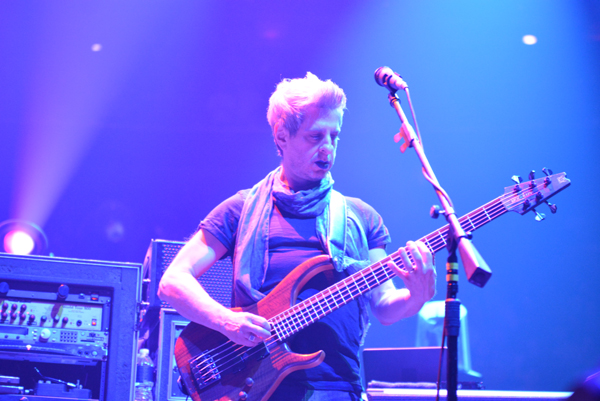
——DANGER: I’VE BEEN TOLD TO EXPECT IT—-
You know what I missed about Phish shows in recent years? The element of danger. The expectation of unpredictability. The feeling that anything can happen. We’re all just trying to figure out our own where’s and why’s and when’s and how’s, but when Phish would fire up an “Antelope,” they were trying to figure out the same thing…in song form. How were they going to get from the opening riff to the closing proclamation? No idea. We knew, with relative certainty, that we were about to “set the gearshift for the high gear of our soul,” but we had no idea what would happen once we did. Didn’t matter. Because however we ended up at our destination, we knew it would be an incredible adventure getting there. And that we’d be dancing in step, every step of the way.
Phish fans are fond of pointing out that every night is different. Fair or not, Phish tours are often judged by the extent of that variation. During their most historic tours, every moment within their shows had the potential to break free from gravity, and the band would suddenly find themselves playing music that would have been impossible for anybody to imagine before that very second. There was a time when I let that inform my newly-independent world view: Life is limitless.
Look: Every time that Phish takes the stage, the possibility is still there for them to break free from gravity. And, sometimes, they still do. Just not all the time. And, more often than not, just not for the entire show. And, yet, we know that every night still contains the same promise of endless possibilities that we inherently know exist every time we look up at a starry sky. How often do we walk from our front doors to our front seats without so much as an upward glance? Phish shows are supposed to be reminders to LOOK UP! LOOK UP!
But whether we did or we didn’t, on whatever particular night, we leave the show afterwards and continue on with our varied lives. We go back to our hotel rooms, take showers, order room service, and maybe rally to meet up with friends for jokes and smokes and midnight tokes before our black mirrors pull us into the world of concerns and matters of consequence and we go back to our rooms and put ourselves down, not because we took the last possible steps we could take that day but because of calendars and clocks and the endless tick of the endless tock. By mid-afternoon on Monday we’re back to sleepwalking through the days and nights, like everyone else ends up doing for so much of their lives. LOOK UP!! LOOK UP!!
There was a time when I would’ve said the Baker’s Dozen changed all of that. I’m not sure that’s truly true. However, I will say that the Baker’s Dozen changed all of that — for Phish. It seemed to awaken the multi-beast that used to rear its many given heads as it breathed fire across the bleachers, throughout any given…but, also, every given… night in the mid to late ‘90s. Back then, you didn’t walk back to your car talking about that unexpected 20+ minute jam. You walked back talking about the entire show. You walked back in disbelief that that night’s show was, incredulously but undeniably, better than the night before. And you wondered with equal parts fear and anticipation as to how they would top it the next. And they (almost) always did.
As of this writing, Phish has officially performed “Sample in a Jar” live exactly 287 times. And almost all of them are — nearly — identical. It’s a song, not a vehicle. It’s another “Rift,” another “Cavern.” There’s an altered inflection here, there’s a spontaneous fill there. It’s a great song that, when placed right, fulfills a certain function for setlist construction — but it is nobody’s highlight of the night. And yet, during the Baker’s Dozen, when they opened with it on Jam Filled night, it took the band all but two and a half minutes before they went totally off script. And the crowd went wild.
It is worth noting that the crowd went wild BEFORE the jam got started. The crowd went wild at the mere indication that there would, indeed, be a jam. Trey plays a note that’s significantly different than whatever’s come there before, stating his intention, and it seemed like everyone in the audience picked up on it instantaneously. That was us, and the band, looking up at the sky, being reminded of endless possibility. LOOK UP!! LOOK UP!! It only took them 287 times to find the “Sample in a Jam.” But they found it.
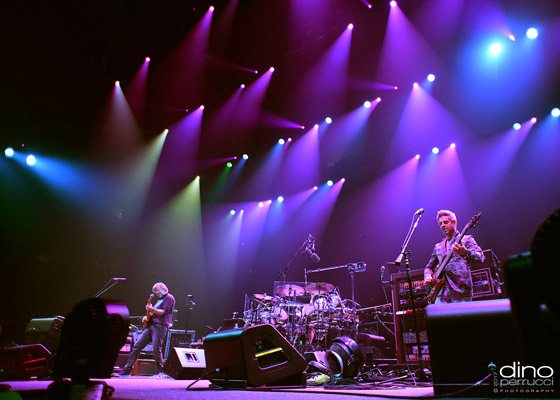
—- AND SO ON AND SO FORTH —
Back at the Ritz Carlton, I continued my conversation with Gordon, as the bar slowly got thicker and thicker with the night-before crowd. Does humor belong in music when you’re a successful, middle-aged musician? Does the world belong to youth? Can’t this wait till I’m old, can I live while I’m young? We talked, but nothing was conclusive. We left the bar and as I got back to my room, I could see a part of Soldier’s Field from my window, and I wondered if there will ever come a day when Phish comes back to life after a long dormancy for a final farewell. And I thought about the more than 100,000 Deadheads in town that weekend because the Grateful Dead legitimately changed lives in a very similar fashion to all of the above, but on an even bigger scale. They made a positive and very real impact that can still be felt in various corners of American folklore, let alone popular culture, let alone in people’s individual lives. I’m raising my own hand here, too. Fare Thee Well was never about new music; it was about honoring the old. But it wasn’t purely about nostalgia either; it was about providing those life-changing moments, in the here and now, one more time.
The next day, I went over to the venue in time for soundcheck. As I rode over there with Bill Kreutzmann, I glanced at my phone and scrolled through some texts from my friends about where we were going to park the RV at Phish’s Magnaball, which was still a month and a half away. I walked with Kreutzmann to the stage. Trey was already out there, looking closely at his rig with his guitar tech as they discussed various nuances. The rest of the Fare Thee Well guys made their way to stage, and pretty soon they were in the middle of a jam from one of the songs that was on the list for that night. A song that they practiced in San Rafael a couple weeks earlier and that each of them knew well. But, also, a song that none of them ever played the exact same way, no matter how many times they’ve played it. I went out into the house to hear how it sounded and suddenly heard the entire band playing something unusual, something they didn’t play in rehearsal — but the notes fit, the ideas worked. I looked up at the stage and Trey was in a trance…looking up at the sky as he played to an empty house. The night had yet to begin. Anything could still happen. LOOK UP!! LOOK UP!!
I made my way over to catering, while they were still working through things onstage and — I kid you not — took a big bite out of a donut. Every day is different. Look up!!
You can follow Benjy Eisen @benjy_eisen



















